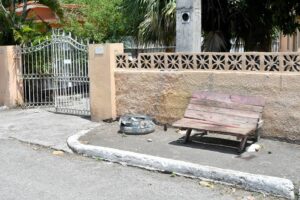
Antigua and Barbuda’s economy rebounds but faces climate, global uncertainty risks — IMF
ANTIGUA and Barbuda’s economy has rebounded beyond pre-pandemic levels but faces significant downside risks from climate vulnerability and global economic uncertainty, the International Monetary Fund (IMF) said on Monday.
The two-island nation posted 4.3 per cent growth in 2024, surpassing pre-pandemic output levels thanks to strong tourism recovery and high-profile events including the T20 Cricket World Cup, according to the IMF’s 2025 Article IV consultation.
Public debt fell dramatically from around 100 per cent of GDP in 2020 to 67 per cent in 2024, reflecting improved fiscal management and economic recovery. However, the gains remain fragile amid multiple challenges.
“Risks are currently tilted to the downside, although upside risks are also present,” IMF’s Executive Board said in its assessment.
The Washington-based lender projects growth to moderate to 3 per cent in 2025 and stabilise around 2.5 per cent over the medium term, as the post-pandemic rebound normalises.
Inflation, which reached 6.4 per cent in 2024 — driven partly by communication costs and indirect tax increases — is expected to ease significantly in coming years.
Still, it points to climate vulnerability which it said represents perhaps the most significant threat to sustained economic progress. Located in the Caribbean hurricane belt, Antigua and Barbuda faces substantial challenges from extreme weather events.
The IMF specifically cited “climate-related vulnerabilities” among key downside risks, noting that these create “substantial adaptation and resilience-building investment needs” for the Government.
Tourism remains the economic backbone, with receipts accounting for approximately 46.8 per cent of GDP in 2024, creating inherent vulnerability to global economic shifts.
“Downside risks emanate from elevated uncertainty about the global outlook; a deepening of geoeconomic fragmentation; commodity price volatility; climate-related vulnerabilities; and capacity constraints in the construction sector,” the IMF report stated.
The current account deficit narrowed to 7 per cent of GDP in 2024, reflecting higher tourism receipts and reduced imports. Foreign direct investment remained resilient, supporting ongoing hotel construction despite tightening global financial conditions.
Despite predominant downside risks, potential upsides exist. The IMF noted that upside risks “stem from stronger demand for tourism; improved air connectivity; new cruise port facilities; hosting of special events; and the intensification of productivity-enhancing structural reforms, which could support higher medium- and long-term growth.”
The fiscal primary balance improved to 4.6 per cent in 2024, aided by indirect tax increases, broader economic recovery, and one-off factors including nearly 2 per cent of GDP from an asset forfeiture.
The IMF recommended several policy priorities to strengthen economic resilience:
“Recent improvements in tax revenue are welcome, with further domestic revenue mobilisation needed in the medium term to ensure fiscal sustainability,” the board stated in its assessment.
On debt management, the IMF warned that “outstanding arrears to domestic suppliers and to the Paris Club remain obstacles to debt sustainability and constrain Antigua and Barbuda’s potential access to external and domestic financing”.
The IMF also emphasised the importance of strengthening fiscal institutions and financial sector stability, noting the recent operationalisation of the Fiscal Responsibility Oversight Committee as a positive step.
“Better-targeted social assistance would enhance inclusion while curbing inefficiencies,” the report added, suggesting the development of a centralised information system to maintain accurate records of all beneficiaries.
The 2025 budget, which the IMF notes “envisages stronger tax revenues and higher capital spending”, will be crucial for addressing these challenges while maintaining fiscal discipline.
Despite challenges, the IMF recognised Antigua and Barbuda’s significant progress in its post-pandemic economic recovery, with continued adaptation needed to address persistent vulnerabilities and build long-term resilience.






















